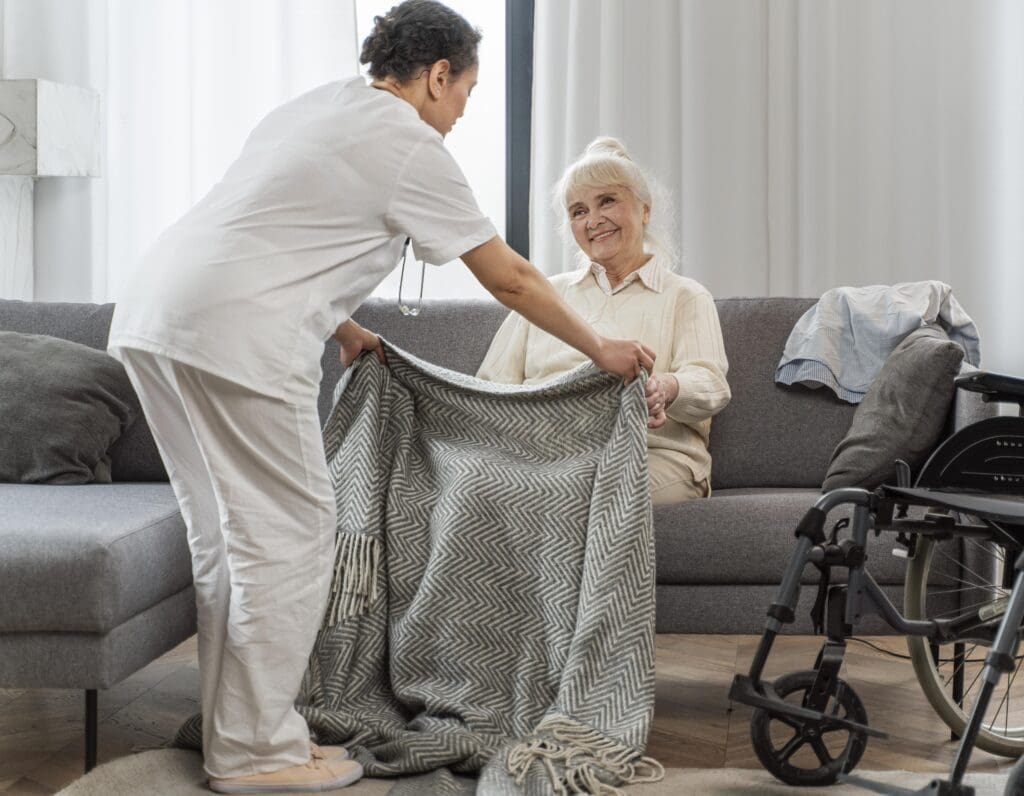Today, 23rd November, marks Carers’ Rights Day in the United Kingdom, a national campaign to raise awareness about the rights of unpaid carers and the challenges they face.
The day is fundamentally designed to empower carers, giving them an opportunity to learn about their rights and access support. With new insights and information, carers can fulfil their roles effectively while feeling recognised and valued.
Many individuals care for friends and family who require it due to age or health, making Carers’ Rights Day an event we all should celebrate.
If you’re an unpaid carer, live-in care can alleviate your tasks. A private live-in care worker will assist with the general needs of an individual or give more complex, specialised care in the comfort of their home.
We understand how challenging unpaid care is, so let’s delve into how their rights came into effect and ways we can all celebrate Carers’ Rights Day.
The Evolution of Carers Rights

During the 1960s, carers’ movement pioneer Mary Webster founded the first carers’ organisation. Later, this organisation merged with another, forming Carers UK.
Since then, thousands of charity members have fought for change and better rights for unpaid carers.
The word ‘carer’ was hardly used before the 1980s, but Webster sparked the change.
The Care Act 2014 came into force in 2015, replacing cumbersome and outdated legislation.
The new act focused on the following:
- Promoting a carer’s wellbeing.
- A right for a carer’s needs to be met.
- Making it a duty for councils to provide carers with information and advice.
This is not an exhaustive list of the rights enforced in 2015; however, it demonstrates a positive shift for unpaid carers.
What is the History of Carers’ Rights Day?
The annual observance, Carers’ Rights Day, was first established by the charity Carers UK.
Carers’ Rights Day has evolved and become a nationally recognised event, emphasising and addressing the rights and needs of carers.
Key Rights and Entitlements for Carers

A question often asked is, ‘What are my employment rights and responsibilities as a carer?’.
Well, as a carer, you are entitled to:
- Flexible working if you are juggling your caring responsibilities with a paid job. You have the right to make this request with your employer.
- Identify as a carer on your patient record, increasing your chances of receiving priority vaccines. Ask your GP practice to make the change to your record.
- Request a free flu jab if you care for someone at risk of becoming seriously ill.
- Be protected against discrimination.
- Have a carer’s assessment if you need extra support.
- Be contacted by the hospital if someone you care for has been discharged.
Challenges Faced by Live-In Carers

As mentioned, if you’re juggling work with your unpaid carer responsibilities, this can be challenging, even with flexible working patterns. Therefore, taking leave might be essential to help you manage day-to-day duties.
The Carer’s Leave Act is expected to be enforced in 2024, enabling you to request up to five days of unpaid leave every twelve months. This change will allow you to remain employed while taking some time off to care for someone. Alternatively, unpaid leave may allow you to care for yourself!
Another act expected to become law in 2024 allows you, as an unpaid carer, to ask your employer for changes to your working hours, times, and place of work from day one.
The above changes will create a better future for carers, helping them feel supported and valued while allowing them some extra time to balance responsibilities and recharge.
Ways to Celebrate Carers’ Rights Day

So, what can you do to support unpaid carers and celebrate what they and you achieve?
Advocate for Change.
Join organisations that advocate positive change for carers, actively making people aware of carers’ rights and challenging outdated practices.
Seek Advice.
If you’re a carer, reach out for support and advice. There are plenty of caregiving organisations, charities, and agencies that can offer assistance and even financial support to carers.
Build a Community.
Build a community by sharing your experiences, challenges, insights, and successes with other carers, helping to validate and empower them and you.
Attend Events.
Caregiving charities and groups often organise events and workshops to raise awareness for unpaid carers; attend these to show your support and gain valuable insight.
Promote Self-Care.
To effectively care for someone, you need to care for yourself. Take necessary steps to ensure your well-being and maintain good physical health.
Now you know of Carers’ Rights Day, whether you are an unpaid carer or not, you’ll understand the challenges carers face and the significance of everyone raising awareness to create positive change.
If you are an unpaid carer, ensure you thoroughly understand your carers’ rights at work, requesting flexible working when you need it to alleviate the pressure of juggling work and caring responsibilities.
As mentioned, a live-in carer can make your life easier, relieving you of any day-to-day duties and providing specialised care if required. Whether an individual needs short or long-term care, at Ivy Palmer, we can match them with one of our live-in carers to ensure general and health needs are met.
Interested in a no-obligation discussion? Then arrange a chat today and discover Ivy Palmer’s live-in care services.